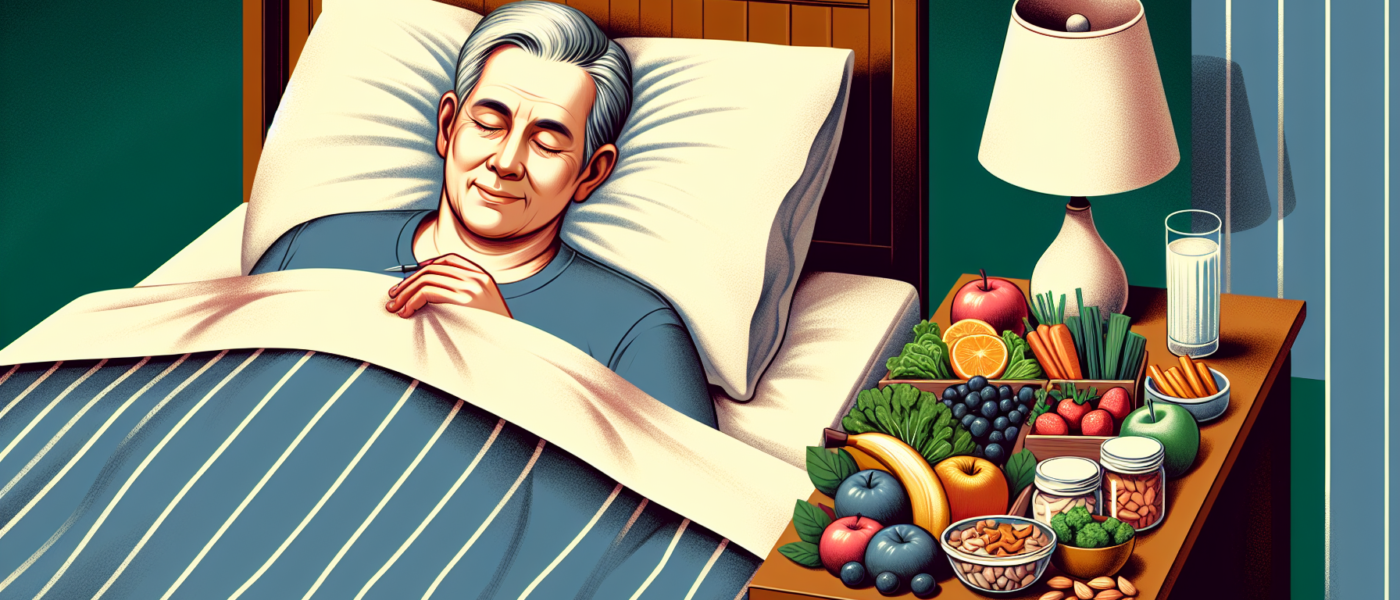The Connection Between Diet and Sleep Quality for Older Men
Key Takeaways
1. A balanced diet can significantly improve sleep quality for older men.
2. Specific nutrients, such as tryptophan, magnesium, and omega-3 fatty acids, are linked to better sleep.
3. Avoiding certain foods and substances, particularly caffeine and alcohol, can also enhance sleep quality.
4. The timing of meals plays a crucial role in maintaining optimal sleep patterns.
5. Chronic sleep issues may require a holistic approach combining diet, lifestyle changes, and medical consultation.
The Importance of Sleep for Older Men
Sleep is a critical component of overall health, particularly as one ages. For older men, sleep quality can affect everything from cognitive function to cardiovascular health, mood stability, and general well-being. Aging naturally brings about changes in sleep patterns, often leading to lighter sleep and more frequent awakenings. While the use of medications and other factors can play a role, diet is a surprisingly significant yet often overlooked influence on sleep quality.
Essential Nutrients for Better Sleep
Certain nutrients are known to bolster sleep quality. Including these in your diet can lead to more restful and sustained sleep patterns.
Tryptophan
Tryptophan is an amino acid found in foods such as turkey, dairy products, nuts, and seeds. It is a precursor to serotonin, a neurotransmitter that regulates sleep. Enhanced serotonin levels can, in turn, boost melatonin production, the hormone responsible for sleep-wake cycles.
Magnesium
Magnesium is a mineral that plays several roles in the body, including muscle relaxation and reducing stress levels. Foods rich in magnesium include leafy greens, legumes, nuts, seeds, and whole grains. A study published in the Journal of Research in Medical Sciences showed that magnesium supplementation can improve several aspects of insomnia.
Omega-3 Fatty Acids
Found in fish, chia seeds, flaxseeds, and walnuts, omega-3 fatty acids have been linked to better sleep quality. These fats are essential for brain health and may help regulate sleep by reducing inflammation and promoting serotonin production.
Foods and Substances to Avoid
While certain foods can improve sleep quality, others can hinder it. Awareness and moderation of these can significantly contribute to better rest.
Caffeine
Caffeine is a stimulant found in coffee, tea, soft drinks, and chocolate. It can interfere with the ability to fall asleep and lead to fragmented sleep. Older men often metabolize caffeine more slowly, making it advisable to limit caffeine intake, especially in the afternoon and evening.
Alcohol
While alcohol may initially induce drowsiness, it can severely disrupt sleep later in the night by interfering with the REM (rapid eye movement) stage of sleep, which is crucial for restorative rest. Limiting alcohol consumption, particularly before bedtime, can promote better sleep health.
Sugary Foods and Refined Carbohydrates
High sugar intake and consumption of refined carbohydrates can lead to blood sugar spikes and crashes, affecting sleep quality. Foods high in sugar and refined carbs should be limited, especially in the hours leading up to bedtime.
The Role of Meal Timing
Not just what you eat but when you eat can significantly affect sleep quality. Here are some guidelines for optimal meal timing:
Balanced Breakfast
Starting the day with a balanced breakfast that includes protein, healthy fats, and complex carbohydrates can stabilize blood sugar levels and prevent energy crashes that could disrupt your sleep-wake cycle.
Evening Meals
Eating a heavy meal right before bedtime can hinder the body’s ability to wind down and prepare for sleep. It’s advisable to have dinner at least three hours before going to bed, ensuring the meal is balanced and not overly rich or heavy.
Healthy Snacks
If you feel hungry before bed, opting for a light, healthy snack like a small bowl of yogurt, a handful of nuts, or a piece of fruit can aid sleep without causing digestive discomfort.
Holistic Approaches to Improving Sleep Quality
While diet is an essential component, a holistic approach including other lifestyle changes can provide more comprehensive solutions to sleep issues.
Exercise
Regular physical activity can help regulate your sleep-wake cycle, reduce stress, and tire your body, making it easier to fall asleep. Aim for at least 30 minutes of moderate exercise most days, but avoid vigorous activities close to bedtime.
Stress Management
High levels of stress and anxiety can lead to insomnia and poor sleep quality. Techniques such as meditation, deep breathing exercises, and mental health counseling can be very beneficial.
Medical Consultation
If sleep issues persist despite dietary and lifestyle changes, consulting a healthcare provider may be necessary. Conditions like sleep apnea, restless leg syndrome, and chronic insomnia often require medical intervention.
Conclusion
The connection between diet and sleep quality is intricate and significant, particularly for older men. By focusing on nutrient-rich foods, avoiding detrimental substances, and paying attention to meal timing, it’s possible to achieve restful, restorative sleep. Coupled with lifestyle adjustments like regular exercise and stress management, a balanced diet can be a powerful tool for improving sleep quality and, consequently, overall health.

